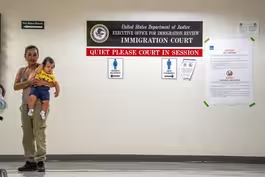
How tariffs on allies impact U.S. strategy to counter China
Clip: 7/22/2025 | 12m 21sVideo has Closed Captions
How Trump's tariffs on Asian allies impact the U.S. strategy to counter China
President Trump says he reached a trade agreement with the Philippines following a White House visit by its president. The U.S., the Philippines and other Asian allies are increasing their cooperation to counter China, but these partners are also being targeted by U.S. trade policies. Nick Schifrin discussed more with Randall Schriver and Lyle Goldstein.
Problems playing video? | Closed Captioning Feedback
Problems playing video? | Closed Captioning Feedback
Major corporate funding for the PBS News Hour is provided by BDO, BNSF, Consumer Cellular, American Cruise Lines, and Raymond James. Funding for the PBS NewsHour Weekend is provided by...

How tariffs on allies impact U.S. strategy to counter China
Clip: 7/22/2025 | 12m 21sVideo has Closed Captions
President Trump says he reached a trade agreement with the Philippines following a White House visit by its president. The U.S., the Philippines and other Asian allies are increasing their cooperation to counter China, but these partners are also being targeted by U.S. trade policies. Nick Schifrin discussed more with Randall Schriver and Lyle Goldstein.
Problems playing video? | Closed Captioning Feedback
How to Watch PBS News Hour
PBS News Hour is available to stream on pbs.org and the free PBS App, available on iPhone, Apple TV, Android TV, Android smartphones, Amazon Fire TV, Amazon Fire Tablet, Roku, Samsung Smart TV, and Vizio.
Providing Support for PBS.org
Learn Moreabout PBS online sponsorshipGEOFF BENNETT: Today, President Trump said he had reached a trade agreement with the Philippines following a White House visit by its president, Ferdinand Marcos Jr. AMNA NAWAZ: He is now the first Southeast Asian leader to visit the Oval Office during Mr. Trump's second term.
The U.S., the Philippines, and other Asian allies are increasing their cooperation to counter what the U.S. calls an expansionist China.
But these partners and allies are also being targeted by U.S. trade policies.
Nick Schifrin has more.
NICK SCHIFRIN: In one of the world's most contested waters, a fierce face-off with China.
Last week, the Philippines Coast Guard intercepted what it called a Chinese spy vessel.
China published this video of what it called Philippines' aggression.
But it has been China flexing its maritime muscles.
Last year, it attacked Filipino ships with water cannons as part of its claims to control nearly the entire South China Sea.
That's a claim contested by over a dozen countries, including by Philippines President Ferdinand Marcos Jr. FERDINAND MARCOS JR., President of the Philippines: We are essentially concerned with the defense of our territory and the exercise of our sovereign rights.
NICK SCHIFRIN: Today, at the White House, Marcos envisioned an expanded regional alliance.
FERDINAND MARCOS JR.: We need to do this with our partners.
And, again, our strongest partner has always been the United States.
I present that position very clearly to anyone who has intentions of unilaterally changing the world order.
NICK SCHIFRIN: The Philippines is the U.S.' oldest Pacific ally, and the U.S. is treaty-obligated to come to its defense.
In recent years, that defense relationship has boomed.
U.S. and Philippines troops recently held large exercises that for the first time deployed American anti-ship missiles pointed at waters near Taiwan.
In fact, in recent years, the U.S. has increased its military presence from the Philippines to Japan, including on bases that are closer to Taiwan than they are to the capitals Manila and Tokyo.
The U.S. has prioritized creating multiple regional military alliances willing to confront Beijing together.
That's an effort continued under this Trump administration, which has expanded warnings over Taiwan.
PETE HEGSETH, U.S. Defense Secretary: Any attempt by communist China to conquer Taiwan by force would result in devastating consequences for the Indo-Pacific and the world.
There's no reason to sugarcoat it.
The threat China poses is real and it could be imminent.
We hope not.
But it certainly could be.
NICK SCHIFRIN: But, today, President Trump concentrated on cooperation with China.
DONALD TRUMP, President of the United States: And I don't mind if he gets along with China, because we're getting along with China very well.
We have a very good relationship.
In fact, the magnets, which is a little complex piece of material, but the magnets are coming out very well.
They're sending them in record numbers.
NICK SCHIFRIN: Beijing first withheld rare earth magnet exports, leading almost immediately to Ford temporarily idling some U.S. factories.
A U.S.-China trade truce has restarted the exports, and President Trump today said he'd reached a broad trade agreement with Marcos.
DONALD TRUMP: It's a lot of income coming in for both groups, but I was surprised to see the kind of numbers.
They're very big, and they're going to get bigger under what we're doing and what we're proposing.
NICK SCHIFRIN: President Trump said in a post online this afternoon that Marcos agreed to remove tariffs on all U.S. imports and that the U.S. would impose a 19 percent tariff on Philippines goods.
There's been no confirmation yet from the Philippines.
But that 19 percent is the same percentage the U.S. will impose on Indonesian goods in a new framework deal with that country, also announced today.
For a perspective on the Trump administration's overall approach to Asia, we get two views.
Randall Schriver was assistant secretary of defense for Indo-Pacific affairs during the first Trump administration.
He's now chairman of the Institute for Indo-Pacific Security.
And Lyle Goldstein is the director for Asia engagement at Defense Priorities, a think tank that advocates for a noninterventionist U.S. foreign policy.
He's director of the China Initiative at Brown University.
Thanks very much.
Welcome to both of you.
Randall Schriver, let me start with you.
I just mentioned how the U.S. has expanded defense cooperation across the Pacific, including exercising recently on a base in the Philippines that is basically closer to Taiwan than it is to Manila.
Why is that kind of presence important to U.S. interests and plans in Asia?
RANDALL SCHRIVER, Former U.S. Assistant Secretary of Defense for Indonesia-Pacific Affairs: Well, we're a distant power and we're reliant on friends and allies for access for our forward-deployed forces.
Taiwan is an important country to us, an important relationship for the region.
Any threat to Taiwan, we'd want to at least be positioned to respond to.
Whether or not we do so militarily is a political decision, but we want to be in position, and the Philippines is key to that.
NICK SCHIFRIN: Lyle Goldstein, respond to that.
The U.S. sees the region as needing to expand its presence, especially to be in position in case the political decision is made to defend Taiwan.
What's your response to that?
LYLE GOLDSTEIN, Director of Asia Engagement, Defense Priorities: Yes, what I see, Nick, is something very dangerous.
To me, we have been quite focused on the South China Sea issue and some bullying going on, mostly regarding fishing issues or oil exploration in the South China Sea.
But this increasing inclination to tie the south -- the Philippines into the Taiwan issue, I think, is very, very dangerous.
And I think we have seen a steady uptick in -- since that's been going on, in Philippines-China relations, which are really very dicey.
So is the Taiwan Strait situation.
I'm urging Washington decision-makers to act with the utmost caution here.
This is extremely dangerous, Nick.
NICK SCHIFRIN: Randall Schriver, is it dangerous to expand cooperation with the Philippines with the context of what you and I were talking about, Taiwan?
RANDALL SCHRIVER: Well, I think it needs to be done with a degree of deftness.
But I believe that these moves are actually helping deterrence and helping stabilize the situation.
To do nothing, I think, is actually the real risk because I think China's ambitions are quite significant here.
And we want to be able to be able to keep peace and stability in the free and open order in the region.
NICK SCHIFRIN: Lyle Goldstein, take that on again, doing nothing or at least doing less than what multiple administrations have done would reduce deterrence.
LYLE GOLDSTEIN: Yes, we're not advocating for doing nothing.
Of course, we think that Philippines is a value treaty ally, and we support various cooperative actions with the Philippines.
It's just we think it's critically important that they have a kind of defensive character that is -- that we should make our alliance with the Philippines very much in the spirit of defensive defense, not, that is to say, leaning into the Taiwan situation.
Mr. Schriver just characterized Taiwan as a country.
And that reflects a kind of big misperception in Washington, D.C., it seems to me.
We -- our official policy is that there is a One China policy.
We do not recognize China -- Taiwan as a country.
And, therefore, it seems to me we had better be very cautious here.
And the situation across the Taiwan Strait is getting more and more tense.
I'm of the view -- I'm a defense analyst -- of the military balance -- there is no military balance.
China has vast military superiority against Taiwan and against the Philippines.
So we had better not get our servicemen into a situation which is effectively mission impossible.
Bridge Colby alluded to this when he said that -- what was it he said?
This is probably not viable.
In part, what he was saying was, it's just -- Taiwan is just not defensible.
NICK SCHIFRIN: Randy Schriver, is there a misperception in Washington, D.C., about Taiwan?
And is it mission: impossible to defend Taiwan?
RANDALL SCHRIVER: On the first, there may be among some.
I certainly don't have any misperception.
I have traveled there quite a bit.
And to the untrained eye, it looks awful like a country with a president, its own currency, its own military, its own defined geography.
And it is recognized by at least a dozen countries in the world right now.
So I use the phrase that I think is appropriate.
Is it indefensible?
Well, that's actually not what Bridge Colby is saying, and that's not what the Department of Defense interim national defense strategy says.
But it does require taking certain moves, certain cooperative activities with our partners and allies, certain things in our own force modernization plans.
And, look, Taiwan is tough.
It's 80 nautical miles of water, mountainous, inhospitable terrain, unfavorable sea conditions for most of the year, unfavorable ports for embarkation.
This is a tough target for a military that hasn't seen combat since 1979.
So I don't think it's indefensible.
NICK SCHIFRIN: Lyle Goldstein, let me just clarify.
Bridge Colby, who we're talking about now, is the number three in the Pentagon, the undersecretary of defense for policy.
And the national defense strategy that Randy Schriver just brought up does use unprecedented language on Taiwan in the context of making sure that the U.S. focus on China.
And the language includes that the U.S. needs to prevent a fait accompli takeover by Beijing of Taiwan.
Is that kind of focus on Taiwan, is -- do you think, is that wise?
LYLE GOLDSTEIN: No, it's not wise.
I mean, Colby's language there and his confirmation hearing was a considerable walk-back from his book-, where he had kind of outlined a more kind of, let's say, a larger view of our interests.
He seems to have rethought it wisely.
Now, I mean, if we listen to President Trump here, you would see he didn't mention the South China Sea.
He didn't mention going to war over rocks or reefs.
He said nothing about the Taiwan Strait or the Luzon Strait.
So he's focused on commerce and... NICK SCHIFRIN: Luzon Strait in North Philippines.
LYLE GOLDSTEIN: Right.
And all of his statements on Taiwan have tended to be extremely cautious, which is in my view very wise.
He has definitely taken a different approach, say, than President Biden, who I think four times said that we would definitely defend Taiwan.
He -- President Trump very clearly stated otherwise.
And in Secretary of Defense Hegseth's remarks, he made it very clear that, sure, U.S. forces should get ready for a bad day in the Western Pacific.
But he also said it's not his call to make and that whether we would actually do this remains unknown.
I and many others are -- who look at the military balance are suggesting this could be a terrible catastrophe, not only with nuclear overtones, but a recent Washington simulation of this suggested that we would lose two aircraft carriers within the first week.
Just imagine that.
That's thousands of Americans lost, devastating loss.
NICK SCHIFRIN: Lyle Goldstein, sorry.
Randy Schriver, I only have about 30 seconds left.
So just take last word here.
Does the president's targeting U.S. allies and partners when it comes to tariffs, could that undermine an overall strategy in Asia?
RANDALL SCHRIVER: I am concerned about that.
I think the Defense Department and national security officials that are looking at defense issues think they can be siloed.
But I'm concerned that most of what our Asian partners and allies are worried about it.
And what they're focused on is the tariffs and the trade tensions.
NICK SCHIFRIN: Lyle Goldstein, very quickly, you as well.
Are you worried about these trade and tariffs interrupting the overall strategy?
LYLE GOLDSTEIN: No, I'm not.
I think some winds of change are blowing across the region.
All countries, including ours, are rightly more focused on commerce.
Let's try to decrease the dangers throughout the region.
NICK SCHIFRIN: Lyle Goldstein, Randy Schriver, thanks very much to you both.
RANDALL SCHRIVER: Thank you.
LYLE GOLDSTEIN: Thanks very much.
As immigration courts see backlog, DOJ cuts dozens of judges
Video has Closed Captions
Clip: 7/22/2025 | 5m 37s | As immigration courts face backlog, DOJ cuts dozens of judges (5m 37s)
Branden Jacobs-Jenkins on the inspiration for 'Purpose'
Video has Closed Captions
Clip: 7/22/2025 | 6m 27s | Branden Jacobs-Jenkins on the inspiration for 'Purpose,' his Tony-winning family drama (6m 27s)
Examining the facts about birth control amid misinformation
Video has Closed Captions
Clip: 7/22/2025 | 7m 50s | Examining the facts about contraceptives as birth control misinformation spreads online (7m 50s)
News Wrap: UN says 1,000 Gazans seeking aid killed since May
Video has Closed Captions
Clip: 7/22/2025 | 5m 58s | News Wrap: UN says Israeli forces have killed more than 1,000 Gazans seeking aid since May (5m 58s)
Trump deflects questions as House avoids Epstein files vote
Video has Closed Captions
Clip: 7/22/2025 | 8m 21s | Trump deflects Epstein questions as Johnson shuts down House, avoiding vote on files (8m 21s)
Volunteers bring relief and hope to Texas flood victims
Video has Closed Captions
Clip: 7/22/2025 | 5m 59s | Volunteers provide relief and restore hope for Texas flood victims (5m 59s)
Providing Support for PBS.org
Learn Moreabout PBS online sponsorshipSupport for PBS provided by:
Major corporate funding for the PBS News Hour is provided by BDO, BNSF, Consumer Cellular, American Cruise Lines, and Raymond James. Funding for the PBS NewsHour Weekend is provided by...

















